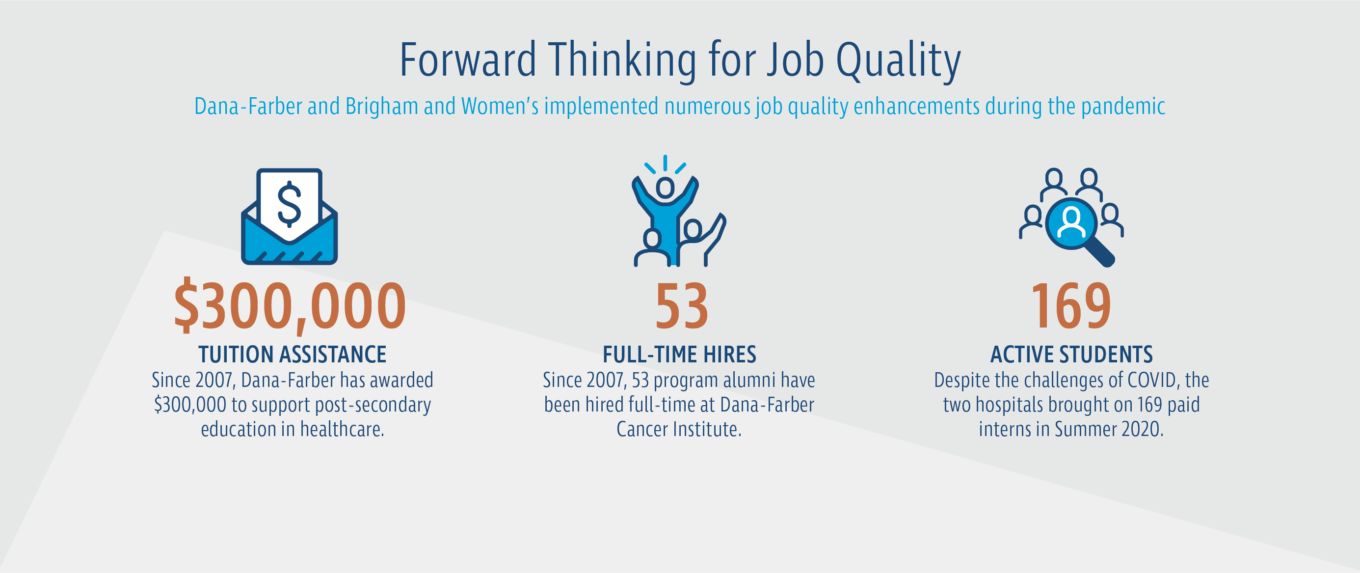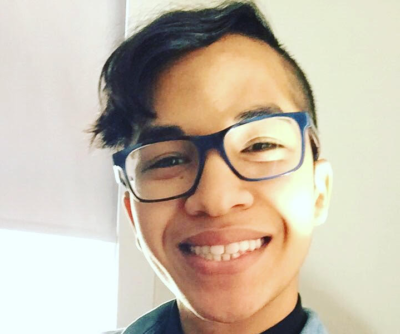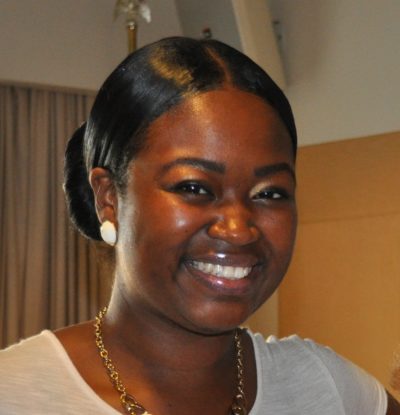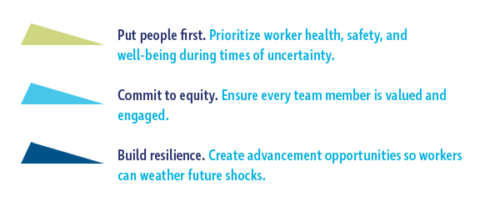Dana-Farber Cancer Institute and Brigham and Women’s Health
Students Heading Into Healthcare Careers
Before COVID-19 upended the academic and professional universe in 2020, Boston-area students interested in learning about the healthcare industry could do so through hands-on, paid internships hosted by a group of hospitals including Dana-Farber Cancer Institute and Brigham and Women’s Hospital.
Recruited from under-represented communities by the Boston-based Private Industry Council, high school and college students in these summer youth employment programs learned fundamental job, college-readiness, and life skills. It was also an opportunity for hospitals to build a more diverse future workforce that better reflects the communities they serve.

Partners commit to keep the program going—but with some changes
Then came the coronavirus and mandatory lockdowns. Suddenly, the hospitals needed to pivot to a virtual work and learning environment to ensure student safety.
“I was adamant that we were still going to have a program,” said Carmen Santos, a workforce development specialist who oversees the interns at Brigham and Women’s. “Students depend on these opportunities. As much as they are good exposure to work life, it also helps them support their families. A lot of students’ families were out of work.”
To figure out how to keep the summer program going through the pandemic, Santos reached out to others who were facing the same challenges, namely, her colleagues at competing Boston-area hospitals. These colleagues all participate in the Boston healthcare industry partnership and have long history of collaborating to solve regional workforce challenges. By working together and merging some of their summer offerings in an online program, they not only salvaged their individual programs, but provided a broader range of opportunities to students.
Each week during so-called “common blocks,” as many as 500 students could simultaneously take virtual college tours or participate in online discussions with doctors from a wider range of healthcare institutions. Instead of just learning about specific hospital departments, students could join learning modules on career exploration, financial literacy, health and self-care wellness, public policy and social justice, and STEM.
 |
– Tom Nguyen, Senior Research Data Specialist at Dana-Farber Cancer Institute and 2011 High School Intern |
A peer-mentoring approach facilitates teaching and learning
Brigham and Women’s tapped into its older students to help overhaul its individual summer youth experience as well. Zamzam Warsame, who first joined Brigham and Women’s as a high school intern in 2019, was one of the college interns asked to team up to create the curriculum for the younger students — and then teach it.
“We weren’t expecting all this to happen,” said Warsame, who had been hoping to work in the blood bank. “We had to adapt.”
Santos gave the college interns a list of topics to cover and the students divvied up the work, forming committees and assigning tasks. “Each person made a curriculum for a specific week,” said Sabrina Ng, a nursing major at Boston College.
Merging the high school and college programs gave the older students an opportunity to learn leadership, self-management, and team development skills.
Peer mentoring has always been part of the program at Dana-Farber. Paola Tabares, a college intern who joined the program as a high school freshman in 2015, remembers the patience her mentors showed when she needed to learn how to adopt a professional demeanor. She calls upon that experience when helping younger students. She understands that maturity brings with it greater responsibility.
“There’s more of an expectation for you to solve things on your own,” she said. “Myself, as someone who’s been in the program for six years, having that little bit of pressure is helpful.”
– Paola Tabares, Current High School Intern |
 |
The opportunity for a long-term career trajectory
At Dana-Farber, interns are groomed for full-time positions but often stay connected to the program once hired. Doing so allows them to give back to something that meant a lot to their own advancement, said Tom Nguyen. He joined Dana-Farber as a high school intern in 2011 and now works as a senior research data specialist with the thoracic oncology group. He has been promoted several times over the past 10 years and has never worked anywhere else.
Tabares, who wants to become a physician assistant, credits her current career trajectory to the internship program. Dana-Farber introduced her to a range of healthcare options through informational sessions and interviews with people working in various jobs. The first in her family to attend college, she also credits the program with helping her apply to schools and find scholarships to cover her tuition.
Nguyen, who is now earning his graduate degree in public health at Boston University, said Dana-Farber is helping to pay his tuition – a perk of working there full-time.
 |
– Icandace Woods, Program Manager at Dana-Farber Cancer Institute and 2004 High School Intern |
Compassionate support for the far-reaching impact of COVID-19
The hospital supports its staff in other ways, as well, said Icandace Woods, who started as a high school intern in 2004. Today she’s a program manager at Dana-Farber’s lung cancer center.
She was moved by the hospital’s offer to help pay for funeral expenses when two of her family members died of COVID-19. “So many members of my family had lost their jobs and some people were being cut off of unemployment,” she said. “[The cancer center was] able to pay for some of the services for my uncle and then also pay for his tombstone, and, I mean, one may say that’s only $400, but that $400 meant so much.”
They also reached out to see if she needed someone to talk to, she said, something Dana-Farber also did for staff in response to the social justice movement that arose following George Floyd’s murder in 2020.
“That’s one of the things that make this workplace so unique,” Woods said. “Our voices are being heard. It’s not just, ‘Let’s support the patient, let’s support the family,’ but ‘Let’s support the staff that are here, too, because they’re a part of making this an amazing place and we need to make sure our staff members are in a healthy place before we can do anything.”
About Frontline Forward
With Frontline Forward, the National Fund for Workforce Solutions recognizes employers whose good jobs practices have protected, supported, and developed frontline workers throughout the pandemic and beyond. These businesses have made the workplace safer and provided compassion, support, and flexibility to families during this time of illness and uncertainty. They offer advancement opportunities, so workers are more resilient to future shocks. Most importantly, they’ve created a workplace culture that ensures every team member is valued and given the chance to take part in their own — as well as the company’s – success.
The Frontline Forward Principles

Frontline Forward is made possible through a generous investment from Walmart to engage service sector employers to improve the quality of their jobs.



